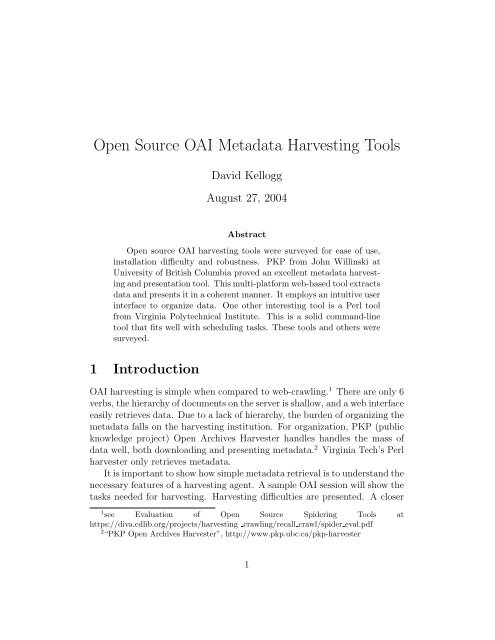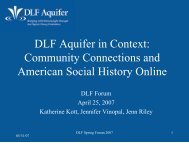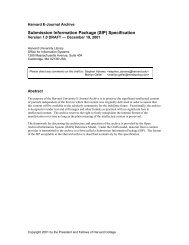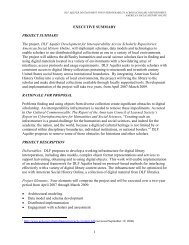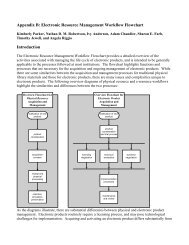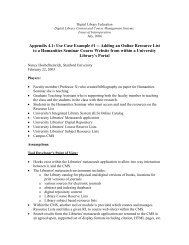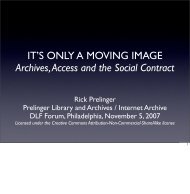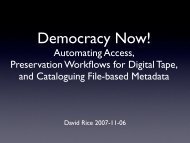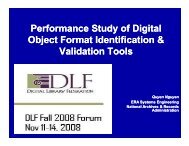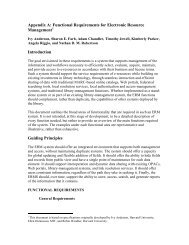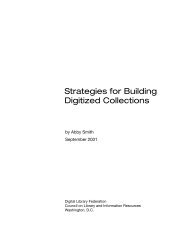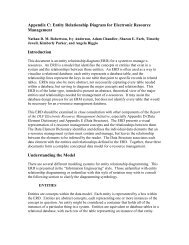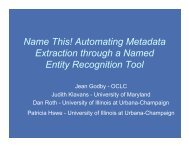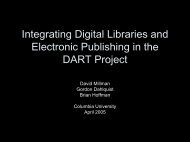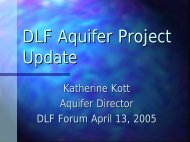Open Source OAI Metadata Harvesting Tools
Open Source OAI Metadata Harvesting Tools
Open Source OAI Metadata Harvesting Tools
You also want an ePaper? Increase the reach of your titles
YUMPU automatically turns print PDFs into web optimized ePapers that Google loves.
<strong>Open</strong> <strong>Source</strong> <strong>OAI</strong> <strong>Metadata</strong> <strong>Harvesting</strong> <strong>Tools</strong><br />
David Kellogg<br />
August 27, 2004<br />
Abstract<br />
<strong>Open</strong> source <strong>OAI</strong> harvesting tools were surveyed for ease of use,<br />
installation difficulty and robustness. PKP from John Willinski at<br />
University of British Columbia proved an excellent metadata harvesting<br />
and presentation tool. This multi-platform web-based tool extracts<br />
data and presents it in a coherent manner. It employs an intuitive user<br />
interface to organize data. One other interesting tool is a Perl tool<br />
from Virginia Polytechnical Institute. This is a solid command-line<br />
tool that fits well with scheduling tasks. These tools and others were<br />
surveyed.<br />
1 Introduction<br />
<strong>OAI</strong> harvesting is simple when compared to web-crawling. 1 There are only 6<br />
verbs, the hierarchy of documents on the server is shallow, and a web interface<br />
easily retrieves data. Due to a lack of hierarchy, the burden of organizing the<br />
metadata falls on the harvesting institution. For organization, PKP (public<br />
knowledge project) <strong>Open</strong> Archives Harvester handles handles the mass of<br />
data well, both downloading and presenting metadata. 2 Virginia Tech’s Perl<br />
harvester only retrieves metadata.<br />
It is important to show how simple metadata retrieval is to understand the<br />
necessary features of a harvesting agent. A sample <strong>OAI</strong> session will show the<br />
tasks needed for harvesting. <strong>Harvesting</strong> difficulties are presented. A closer<br />
1 see Evaluation of <strong>Open</strong> <strong>Source</strong> Spidering <strong>Tools</strong> at<br />
https://diva.cdlib.org/projects/harvesting crawling/recall crawl/spider eval.pdf<br />
2 “PKP <strong>Open</strong> Archives Harvester”, http://www.pkp.ubc.ca/pkp-harvester<br />
1
look will be given to PKP <strong>Open</strong> Archive Harvester and the Virginia Tech<br />
Perl Harvester. Other Harvesters, most of performed poorly with respect to<br />
installation ease, are also explored.<br />
Figure 1: PKP<br />
2 Sample <strong>OAI</strong> Session<br />
The following shows an <strong>OAI</strong> harvesting session, which can be reproduced in<br />
a web browser, such as Firefox. Replies are all wrapped in XML markup.<br />
Step 1. This returns information about the database.<br />
http://dlese.org/oai/providerverb=Identify<br />
Reply: ‘‘DLESE’s mission is to improve . . .’’<br />
Step 2. This lists formats, e.g. oai dc.<br />
http://dlese.org/oai/providerverb=List<strong>Metadata</strong>Formats<br />
Reply: ‘‘oai dc . . . adn . . .’’<br />
2
Step 3. This lists sets.<br />
http://dlese.org/oai/providerverb=ListSets<br />
Reply: ‘‘nsdl . . . comet . . .’’<br />
Step 4. This returns a long list of records.<br />
http://dlese.org/oai/providerverb=ListIdentifiers&from=1998-01-15&<br />
metadataPrefix=oai dc&set=<br />
Reply: ‘‘oai:dlese.org:COMET-74 . . .’’<br />
Step 5. We can pick one out with this.<br />
http://dlese.org/oai/providerverb=GetRecord&metadataPrefix=oai dc&<br />
identifier=oai:dlese.org:COMET-74<br />
Step 6. This returns a single Dublin Core record.<br />
http://dlese.org/oai/providerverb=GetRecord&metadataPrefix=oai dc&<br />
identifier=oai:dlese.org:DLESE-000-000-000-698<br />
Reply:<br />
...<br />
<br />
<br />
<br />
oai:dlese.org:DLESE-000-000-000-698<br />
2004-08-19T21:05:02Z<br />
nsdl<br />
<br />
<br />
<br />
<br />
Anthony’s Nose, New York:<br />
A Review of Three Mineral Localities (title provided or enhanced<br />
by cataloger)<br />
3
Mineralogy or petrology<br />
<br />
This web site describes ...<br />
...<br />
Copyright 1998 John Betts and Bob’s Rock Shop.<br />
All rights reserved.<br />
<br />
<br />
<br />
<br />
<br />
<br />
The sixth verb used in <strong>OAI</strong> harvesting is ListRecords. This is similar to Get-<br />
Record, but it retrieves multiple records instead of a single one. One verb<br />
not used in harvesting is Document, which is used for testing.<br />
3 <strong>Harvesting</strong> Challenges<br />
There are several difficulties in harvesting metadata. A metadata harvester<br />
needs to start and stop retrieval at arbitrary points in the set to allow parts<br />
of large collections to be downloaded. Much data is corrupted and does not<br />
parse well using a tool such as SAX. Invalid data should not crash or stop<br />
the parser, but often it does. It is important, therefore, to have access to the<br />
raw data in cases of poor formating. A harvester can be created that is quite<br />
simple, as with the above. Most of the work requires transforming broken<br />
data into usable sets.<br />
4 PKP<br />
PKP was developed at the University of British Columbia for <strong>OAI</strong> metadata<br />
harvesting and retrieval. The entire site, including harvester and search<br />
4
engine works out of the box. The site installs easily into a LAMP-based 3<br />
server (Linux-Apache-MySQL-PHP 4 ) without writing configuration files or<br />
installing non-LAMP dependencies. The code is readable and well-documented.<br />
This software is flexible, so it can be installed on Windows using open source<br />
tools alone.<br />
4.1 <strong>Harvesting</strong> in PKP<br />
<strong>Harvesting</strong> in PKP is managed through a web page from a server running<br />
PHP and MySQL. In the browser adding an archive and running it is simple.<br />
In a test run, over 8000 metadata records from the DLESE database were<br />
found and indexed.<br />
4.2 PKP Search Engine<br />
The PKP search engine showed varied results. A search for “high school” did<br />
not always surface the words “high” and “school” in the metadata record.<br />
This appears to be an “Or” search by default. Over 4000 of the 8000 records<br />
were shown to contain at least one of these search terms. Using “high school<br />
course” reveals the same result. A quick scan of the linked record showed no<br />
evidence of the word, “course”.<br />
4.3 GUI<br />
Among GUI interfaces, this is an impressive design. It is easy to navigate<br />
the site and find the administrative tools to harvest archives and search<br />
them. Links lead to an advanced search. Administration access is password<br />
protected. With administration access, archives can be searched. Without<br />
administrative access, the user can browse the retrieved records.<br />
3 This is the chosen platform for Amazon, Paypal, Slashdot and Google. For origins,<br />
see http://www.onlamp.com/pub/a/onlamp/2001/01/25/lamp.html<br />
4 To complicate matters, the P in LAMP can mean Python, Perl or Ruby. M can mean<br />
PostGreSQL<br />
5
5 Virginia Tech Perl Harvester<br />
The Perl harvester from Virginia Tech 5 performed well on tests. It was able<br />
to retrieve <strong>OAI</strong> records using the command line. This can be integrated into<br />
a cron job for daily updating.<br />
6 Other Harvesters<br />
Other harvesters were used. Most did not work out of the box. In these<br />
cases READMEand INSTALLfiles were both read and followed. Additional dependencies<br />
were met. Then still, most harvesters did not work. This contrasts<br />
sharply with web crawlers, where over 90 percent worked out of the box for<br />
what is in nearly all aspects a more difficult task. This is a multi-platform<br />
issue. Academics often insisted on a specific platform with numerous dependencies.<br />
These undocumented dependencies led to difficult compilations.<br />
Most harvesters required support to install them. In the interest of finding<br />
more capable harvesters, these were left aside. The following were additional<br />
harvesters that were evaluated.<br />
ODL. Easy to use Perl tool. Downloads and arranges data well. It seemed<br />
not to be able to download data successively from the same set. No<br />
error message was shown.<br />
UIUC Java Harvester. Difficult to install. Requires JDBC. Documentation<br />
required editing the server line in the configuration. It did not<br />
state which server to edit, since 2 to 4 server strings appeared in the<br />
configuration file.<br />
UIUC VB Harvester. This MS Visual Basic Program requires MSXML.<br />
Based on Access DB, a database that commonly corrupts the data after<br />
passing the 1GB mark.<br />
IVia. Requires many C libraries and a Debian system.<br />
my<strong>OAI</strong>. Project website worked well. Local downloaded Perl script did not<br />
download data.<br />
CPAN <strong>OAI</strong>::Harvester. This Perl module required many dependencies,<br />
such as packages HTML, HTTP, libwww, Net, SAX, URI and XML::SAX.<br />
5 http://oai.dlib.vt.edu/odl/software/harvest<br />
6
7 Conclusion<br />
Two metadata harvesters showed promise to add as a module in a metadata<br />
retrieval and browsing program, PKP <strong>Open</strong> Archive Harvester and Virginia<br />
Tech Perl Harvester. PKP used an impressive GUI, and Virginia Tech created<br />
a very flexible command line harvester. Other harvesters were tested, but<br />
most were difficult to install. Because the greatest difficulty in these programs<br />
will be in organizing and repairing the metadata and XML, it is best to choose<br />
a flexible tool, which can be extended to handle non-standard data.<br />
8 Location<br />
The location of this document is<br />
https://diva.cdlib.org/projects/crawling harvesting/<br />
oai harvesting.pdf<br />
This document is written in L A TEX.<br />
7


